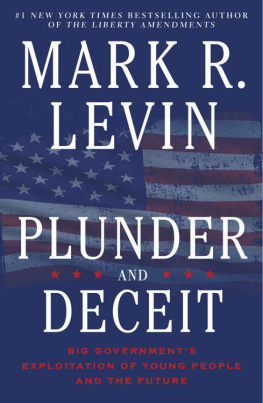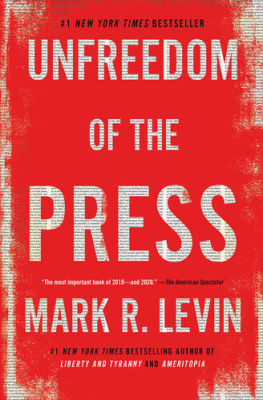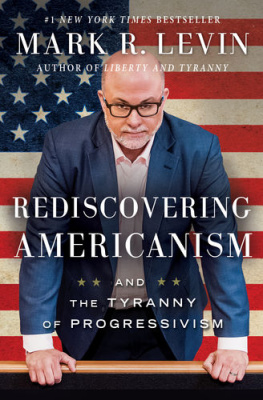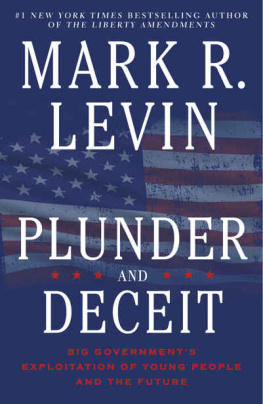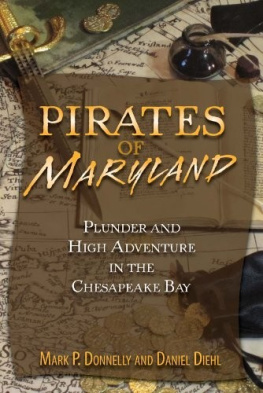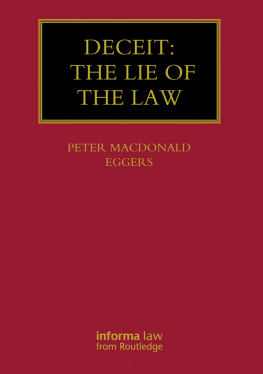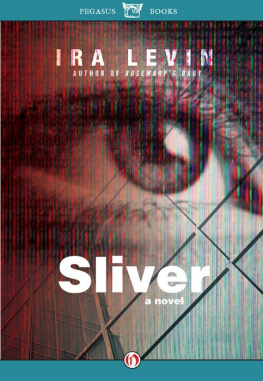Mark R. Levin - Plunder and Deceit
Here you can read online Mark R. Levin - Plunder and Deceit full text of the book (entire story) in english for free. Download pdf and epub, get meaning, cover and reviews about this ebook. year: 2015, publisher: Threshold Editions, genre: Politics. Description of the work, (preface) as well as reviews are available. Best literature library LitArk.com created for fans of good reading and offers a wide selection of genres:
Romance novel
Science fiction
Adventure
Detective
Science
History
Home and family
Prose
Art
Politics
Computer
Non-fiction
Religion
Business
Children
Humor
Choose a favorite category and find really read worthwhile books. Enjoy immersion in the world of imagination, feel the emotions of the characters or learn something new for yourself, make an fascinating discovery.
- Book:Plunder and Deceit
- Author:
- Publisher:Threshold Editions
- Genre:
- Year:2015
- Rating:5 / 5
- Favourites:Add to favourites
- Your mark:
- 100
- 1
- 2
- 3
- 4
- 5
Plunder and Deceit: summary, description and annotation
We offer to read an annotation, description, summary or preface (depends on what the author of the book "Plunder and Deceit" wrote himself). If you haven't found the necessary information about the book — write in the comments, we will try to find it.
Plunder and Deceit — read online for free the complete book (whole text) full work
Below is the text of the book, divided by pages. System saving the place of the last page read, allows you to conveniently read the book "Plunder and Deceit" online for free, without having to search again every time where you left off. Put a bookmark, and you can go to the page where you finished reading at any time.
Font size:
Interval:
Bookmark:
Thank you for downloading this Threshold Editions eBook.
Join our mailing list and get updates on new releases, deals, bonus content and other great books from Threshold Editions and Simon & Schuster.
C LICK H ERE T O S IGN U P
or visit us online to sign up at
eBookNews.SimonandSchuster.com

To My Beloved Family, Fellow Countrymen, and Future Generations
Children sweeten labours, but they make misfortunes more bitter: they increase the cares of life, but they mitigate the remembrance of death.
British philosopher and statesman Sir Francis Bacon
CAN WE SIMULTANEOUSLY LOVE our children but betray their generation and generations yet born?
Among the least acknowledged facts of American modernity is the extent to which parents, acting in their familial capacity, naturally and tenaciously guard their young children from threat and peril, to the point of risking their own physical and economic security in extreme cases; however, as part of the political and governing communitythat is, the ruling generation many of these same parents wittingly and unwittingly join with other parents in tolerating, if not enthusiastically championing, disadvantageous and even grievous public policies that jeopardize not only their childrens future but the welfare of successive generations. To be clear, not all parental decisions are impactful or consequential in the lives of children; obviously, not all decisions are equal. Indeed, the most attentive and nurturing parents are not and cannot be conscious of every decision they make inasmuch as the totality of such decisions is likely incalculable even on a weekly or monthly basis. Moreover, in the healthiest families, the most considered parental decisions, based on seemingly prudential judgments, can and do produce unintended consequences. Of course, the same can be said of decisions about public policy and governing in a relatively well-functioning community.
However, there are accepted norms of behavior, a moral order born of experience and knowledge, instinct and faith, teaching and reason, and love and passionthat provide definition for and boundaries between right and wrong, good and evil, and fairness and injustice, applicable to families and societies alike. Hence, a harmony of virtuous interests, informed by tried-and-true traditions, customs, values, and institutions, and cultivated within families and the larger community, preserves and improves the human condition, one individual at a time, and one generation to the next. Broadly speaking, this is the civil society .
Edmund Burke, a political thinker who was born in Ireland and moved to England, where he became a prominent statesman in the eighteenth century, explained that the civil society relies on an intergenerational continuum of the past, the living, and the unborn. He wrote that as the end of such a partnership cannot be obtained in many generations, it becomes a partnership not only between those who are living but between those who are dead, and those who are to be born.
History confirms Burkes observation. To embrace the moral order as parents nurturing their children, yet to abandon the moral order as members of the ruling generation, thereby contributing to predictably deleterious public policies with prospectively calamitous outcomes, is a decadence that leads to unstable and potentially oppressive or even tyrannical conditions which, in the end, degrade and disassemble the civil society and consume their childrens generation and generations beyond. Reformation and recovery may be possible but difficult and complicated, and typically only after the exaction of an enormous human toll.
Burkes commentary was motivated by his reflections on the decade-long French Revolution and his revulsion at the anarchy and horror it unleashed. In the ensuing more than two centuries, and up to this very moment, the world has witnessed much worse. This is not to say that all instances of civil and societal dislocation take the form of bloody revolution or civil war. Obviously, there are varying pathologies peculiar to particular doctrines, cultures, governing systems, and so on. There are also differing events and circumstances, some building over time and others descending more abruptly, that contribute to the character of the discontinuity. But violence is the ultimate exposure.
Before Burke, Charles de Montesquieu, a French philosopher whose life predated the American Revolution but who was hugely influential on the Constitutions Framers, also wrote of the disastrous aftermath of the civil societys abandonment. He explained: When that virtue ceases, ambition enters those hearts that can admit it, and avarice enters them all. Desires change their objects: that which one used to love, one loves no longer. One was free under the laws, one wants to be free against them. Each citizen is like a slave who has escaped from his masters house. What was a maxim is now called severity ; what was a rule is now called constraint ; what was vigilance is now called fear . There, frugality, not the desire to possess, is avarice. Formerly the goods of individuals made up the public treasury; the public treasury has now become the patrimony of individuals. The republic is a cast-off husk, and its strength is no more than the power of a few citizens and the license of all.
In modern America, the unraveling of the civil society had been subtly persistent but is now intensifying. Evidence of rising utopian statismthe allure of political demagogues and self-appointed masterminds peddling abstractions and fantasies in pursuit of a nonexistent paradisiacal society, and the concomitant accretion of governmental power in an increasingly authoritarian and centralized federal Leviathanabounds. As subsequent chapters will demonstrate, the ruling generations governing policies are already forecast to diminish the quality of life of future generations. Among other things, witness the massive welfare and entitlement state, which is concurrently expanding and imploding, and the brazen abandonment of constitutional firewalls and governing limitations. If not appropriately and expeditiously ameliorated, the effects will be dire. And the ruling generation knows it.
An August 2014 Wall Street Journal /NBC poll found that Americans are registering record levels of anxiety about the opportunities available to younger generations and are pessimistic about the nations long-term prospects, directing their blame at elected leaders in Washington.... [S]eventy-six percent of adults lack confidence that their childrens generation will have a better life than they doan all-time high. Some 71% of adults think the country is on the wrong track... and 60% believe the U.S. is in a state of decline.... This widespread discontent is evident among just about every segment of the population. Fifty-seven percent of those polled said that something upset them enough to carry a protest sign for one day. That included 61% of Democrats and 54% of Republicans, as well as 70% of adults who identify with the tea party and 67% of self-described liberals.
It is past time and, therefore, imperative that the ruling generation acquaints itself with James Madisons uncomplicated and cautionary insight, written to bolster the proposed Constitutions ratification at the state conventions. In Federalist 51 , Madison explained the essential balance between the civil society and governmental restraint: But what is government itself, but the greatest of all reflections of human nature? If men were angels, no government would be necessary. If angels were to govern men, neither external nor internal controls on government would be necessary. In framing a government which is to be administered by men over men, the great difficulty lies in this: you must first enable the government to control the governed; and in the next place oblige it to control itself.
Next pageFont size:
Interval:
Bookmark:
Similar books «Plunder and Deceit»
Look at similar books to Plunder and Deceit. We have selected literature similar in name and meaning in the hope of providing readers with more options to find new, interesting, not yet read works.
Discussion, reviews of the book Plunder and Deceit and just readers' own opinions. Leave your comments, write what you think about the work, its meaning or the main characters. Specify what exactly you liked and what you didn't like, and why you think so.

